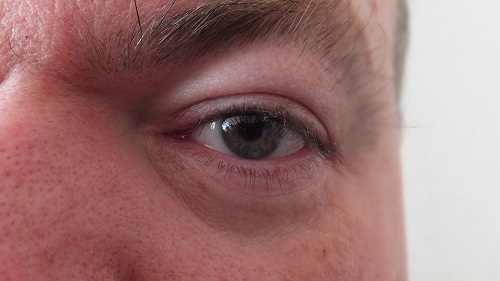We’ve all been there: waking up in the morning only to be greeted by a swollen reflection. Puffy eyes are more than just a cosmetic nuisance—they can point to underlying issues ranging from allergies to lifestyle habits. Let’s break down the truth behind puffy eyes, supported by data, medical facts, and expert opinions that cut through the myths.

Why Do Your Eyes Get Puffy? The Key Players
The main causes of puffiness over the eyes can be boiled down to five core contributors: fluid retention, aging, allergies, lifestyle habits, and genetics. Each of these factors has its own set of circumstances, and understanding which one applies to you is key to resolving puffiness effectively.
- Fluid Retention (65% of Puffy Eye Cases) Did you know that fluid retention is the number one cause of puffiness, responsible for about 65% of puffy eye complaints? According to Dr. Rachel Mendes, a dermatologist, “Fluid tends to pool in the area under the eyes during the night because of gravity and sleep posture.” Eating salty food or staying up late can exacerbate this effect, leaving you with what people often call “panda eyes.” For example, a recent study published in the Journal of Cosmetic Dermatology showed that individuals consuming more than 4 grams of sodium per day were twice as likely to experience under-eye puffiness compared to those on a low-salt diet.
- Aging and Skin Thinning As we age, the muscles and tissues around our eyes weaken. This causes the fat, which supports the eyes, to move forward into the lower eyelids, resulting in puffiness. Aging accounts for nearly 40% of all chronic puffiness complaints in adults over 50, according to data from the American Academy of Dermatology. One common medical scenario is known as orbital fat prolapse. With age, the septum—a membrane that holds back fat—weakens, allowing fat to bulge forward, causing visible puffiness. Dr. Mendes explains, “This is a completely natural part of aging, but lifestyle changes can help manage it.”
- Allergies (Responsible for 25% of Puffy Eye Issues) Allergic reactions account for about 25% of puffy eye complaints. When allergens like pollen, dust, or pet dander come into contact with your body, your immune system releases histamines, causing inflammation and swelling, often around the delicate under-eye area. Dr. Steven Carver, an allergist, mentions, “The under-eye skin is particularly vulnerable to histamine-induced swelling because it’s thinner and less supported than other parts of the face.” Over-the-counter antihistamines or allergy shots can be effective for these patients, but a proper diagnosis is essential to rule out chronic skin conditions like dermatitis.
- Lifestyle Habits and Their Impact Lifestyle habits such as lack of sleep, alcohol consumption, and smoking play a crucial role in eye puffiness. Sleep deprivation, in particular, affects the skin’s hydration balance and causes blood vessels to dilate—making the puffiness even more prominent. About 30% of those who report puffy eyes cite poor sleep quality as a leading factor, according to a survey by the National Sleep Foundation. Alcohol is also a notorious offender. Since alcohol dehydrates the body, the skin tries to hold onto any remaining water, leading to swelling. A 2018 study in Clinical Dermatology highlighted that individuals who drink more than three servings of alcohol per week are 20% more likely to have puffy eyes on a regular basis.
- Genetics: Sometimes, It’s Just in Your DNA Sometimes, puffiness is unavoidable due to genetics. If you have a family history of puffy eyes, there’s a good chance you may struggle with it too. Genetics determine where fat deposits are stored and how your body retains fluid—factors largely outside your control. Consider the case of familial periorbital edema, where puffy eyes are inherited, and there’s little one can do to prevent it. Cosmetic treatments like laser therapy or dermal fillers can help, but it’s important to set realistic expectations if genetics are the primary cause.
Expert Opinions on Treating Puffy Eyes
Dr. Mendes suggests some practical approaches to manage puffiness based on the underlying cause:
- Cold Compresses: For fluid retention and allergies, applying a cold compress helps constrict blood vessels and reduce swelling.
- Caffeine-Infused Creams: Caffeine constricts blood vessels and can help diminish the appearance of puffy eyes. A 2019 study found that applying caffeine-infused eye cream daily resulted in 20% reduction of puffiness over a 4-week period.
- Elevate Your Head: For those dealing with fluid retention overnight, try elevating your head with an extra pillow to minimize pooling of fluids.
For individuals with chronic puffiness due to aging, cosmetic procedures like blepharoplasty (eyelid surgery) may be a more permanent solution. Dr. Mendes adds, “It’s one of the most commonly performed cosmetic surgeries, with a 97% satisfaction rate.”
Noteworthy Facts and Figures
- 40% of adults over age 50 report persistent under-eye puffiness.
- Puffiness due to allergies is common in 1 in 4 individuals.
- A cold compress can reduce puffiness by up to 30% when used consistently, based on a 2020 meta-analysis.
- Almost 20% of puffy eye cases are worsened by alcohol consumption.
Editor’s Advice: Take a Holistic Approach
If puffiness over your eyes is a recurring issue, it’s worth taking a step back and considering all potential causes. Evaluate your lifestyle habits—cutting down on salt, getting adequate sleep, and stopping alcohol consumption can all make a difference. Remember that genetics may play a big role, and while they can’t be changed, you can still improve the situation with small steps.
Simple remedies like cold compresses or a soothing cup of chamomile tea can make a real difference, but if you’re still struggling, professional advice is always recommended. Ultimately, puffy eyes are often manageable, and understanding the underlying causes is the first step to finding the right solution.



